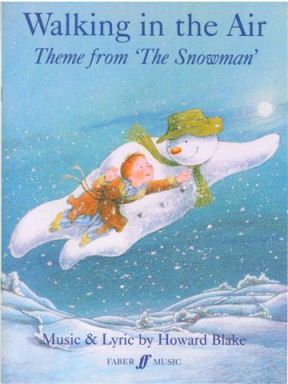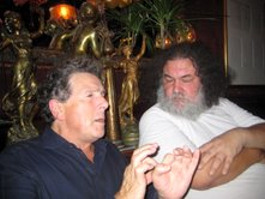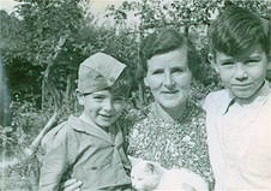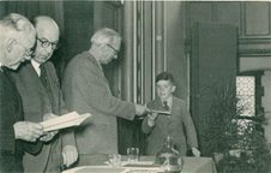Other Links
Editorial Board
- Editor - Bill Kenny
- London Editor-Melanie Eskenazi
- Founder - Len Mullenger
Google Site Search
SEEN
AND HEARD ARTIST INTERVIEW
An Interview with Howard Blake:
The composer of Walking In the Air turns 70 this month.
Bob Briggs discovers more about an extraordinary musician. (BBr)
[ Editor's Note. This interview was intended to take no
more than an hour - the standard length - but developed into an extended conversation over a couple
of beers and a meal, charting the whole of Howard Blake's rich and varied life.
We
publish it without cuts and in three parts, because it is a deeply personal, funny and
often moving account of a fascinating man, noted mostly for one immensely
popular song. ]
There are some things which never seem quite right and somehow don’t
gel in the mind:
The time was then 1945 and with the war was coming to an end the
family moved to Brighton, into a run-down terraced house with some
bomb damage, and Blake joined the choir of Saint Augustine's Church.


Howard Blake (Left) and Bob Briggs - August 2008. Picture ©
Natalie Briggs
-
that Leonard Bernstein will never conduct again,
-
that the England Cricket Team won the recent one day series against
South Africa,
-
that beards might come back into fashion and,
-
that Howard Blake, known to many as the composer of the score to the animated film The Snowman, and the hit song
Walking In The Air, celebrates his 70th birthday on
28th October this year.
What may come as a surprise to many is that there is so much more
to Howard Blake than the public knows; his work list is huge, encompassing both commercial and concert music,
his working knowledge of music and its practitioners is quite
fantastic in its range, and he has a lifetime of experience which
allows him to be able to sit back and write music fully aware of his
own abilities and powers. He knows exactly what he is doing and -
best of all so far as he is concerned -he knows that he can communicate with an audience in a
language which speaks directly to the emotions and packs a big
punch.
I went in search of Howard Blake and we met for at his studio in
West London on 19th August this year. I was late, which
thankfully he didn’t mind, and as he opened a bottle of water,
he started chatting and there was no stopping him. It was fascinating.
What follows is the majority of our chat – I have changed nothing except
that when we talked we developed a kind of shorthand (or perhaps shortmouth?) where we didn’t finish sentences because the person
being talked to knew what was left unsaid and because of their
knowledge of the person doing the talking, or knowledge of the
subject under discussion, the mind automatically filled in the gaps.
The gaps are filled in for this text version to make things clearer
for the reader, and I have not bothered to acknowledge where this
might have occurred: the article would have been twice as long
if I had. Howard has also made a few additions of his own for the
same reason, and these have also not been acknowledged. Anything
which I have added for clarification, such as the names of people
and places which were not spoken, have been added in square
brackets. So please enjoy this meeting with Howard Blake as much as
I did.
His background was not in professional music making:
“There was music in our home, and my mother played the piano. We
lived in this flat and I had this tiny room and there was an
asbestos wall and the piano was the other side of the wall
right up against my ear. I was six. And my mother would play the
piano after I’d gone to bed, and it was deafening. And I just used
to listen. And she played an A minor waltz of Chopin, and I thought,
‘I’ve got to play that’. There was a piano tutor book called Ezra
Reed’s Piano Tutor and it had a picture a keyboard with the notes on
it, so I wrote the names of the notes on the keyboard, with an
indelible pencil, and I actually worked it out and I learned how to
play this Chopin waltz. I learned to play by ear and read music all
in one go. It never seemed difficult; it seemed the obvious thing to
do.”

Howard Blake with Mother and Elder brother 1943 © The Howard
Blake Collection
“I was very lucky, I had an organist called Bartholomew Hales who
was very good. He retired from London - he’d played the organ at the
Temple Church and he studied with George Thalben-Ball – and I
could sing spot–on in tune. He taught me to sing really well and
then I started singing solos in weddings. I used to sing Hear my
Prayer and I Waited for the Lord.”
With all this exposure to music I wondered if Blake had had a moment
of epiphany when he realized that he knew he had to be a
composer.
“I used to write things down, from about the age of 9. I used to
write birthday cards for my family and instead of writing a message
I’d put in five lines and write a song in the birthday card. I
always thought that I liked to write music, but it never occurred to
me, at all, that I could conceivably be a composer, because it
wasn’t the sort of thing people from my background did. When I was
about 12, I wrote a huge March IN INK! A long March, complete with
double octaves and a minor section and a major section and a coda.
I took this piece to [Bonney Churcher, Blake’s piano teacher] and he
said, ‘Where did you get this from?’ I said, ‘I wrote it’, and he
said, ‘You mustn’t lie, sonny, you mustn’t lie’ and he didn’t
believe me! He said, ‘I can’t believe you’ve written that, we must
teach you proper harmony and proper counterpoint, fugue and
everything else. That was wonderful. He bought me a book, [Percy
Buck’s] Practical Harmony, and I did all the exercises. I got
that out of the way, very early on. So I took to writing music.”
After the ritual of the 11-plus, Blake was sent to Brighton, Hove
and Sussex Grammar School for boys, where he was told he'd:
“…have to be a teacher, and I was good at history and I
was going to be a history teacher. I used to spend all of my time
playing the piano, and I had a friend at school [David Shaw] with
whom I used to play duets all the time, then later he inherited a
second piano, from his grandmother, and we played two pianos, which
was terrific. And we played all the repertoire, Haydn Symphonies and
Brahms, the Enigma on two pianos – it was fantastic. I also sang in
Gilbert and Sullivan operas but it still didn’t occur to me that I
could be a musician because my family said, ‘Oh, you’ll never make a
living doing that, it’s totally impossible.’ So I just discounted
it.
“When I was about 16, a local piano teacher heard me play, and said,
‘you’re not being taught properly' and she took me on. She actually
was a very fine teacher, she was the piano teacher at Roedean Girls
School. She studied with Harold Craxton at the RAM, and also
studied with Marguerite Long, friend of Ravel. She came from a rich
family, and her first teacher ever was Adelina de Lara, who’d
actually studied with Clara Schumann! She made me work at the
piano, and she said, ‘you could become a concert pianist,’ and she
put me in for a festival, the Hastings Competitive Music Festival
and she put me in the Bach Prize, the Beethoven Prize, the Chopin
Prize and a scholarship to the Royal Academy. I won all four!!
It was a considerable surprise to me! I went to the headmaster at my
school – my grammar school was not predisposed to music at all – and
I said to him, ‘I’ve won a scholarship to the Royal Academy,’ and he
said, ‘I’m very, very, distressed to hear that because we want you
to go to Oxford and read history. If you take up music it will ruin
your entire life, and you’ll be destitute and on the streets.’ He
wouldn’t announce it, and still, to this day…I went to the reunion
and there’s all these people who’ve won the hop, step and jump in
six hours, or whatever it is, but there’s still no mention that I
won a scholarship to the Academy. Everybody said, ‘you can’t
possibly do that,’ [go to the RAM] I decided to do it. I’m very glad
I did. I would never, I think, have gone into music had I not won
that scholarship.”

School Days ©The Howard Blake Collection
Blake went to the RAM as a pianist – the scholarship was for a
pianist – and intended to study organ as his second subject – he’d
been playing the organ from the age of 12, when he’d been taught by
Bartholomew Hales. But composition was always close by.
“I’d already written a lot of stuff, including a piano trio, I
seem to remember. And when I went to my interview to take up my
scholarship, and to be admitted to the Academy, and I was
interviewed by the warden and the assistant warden, and they said to
me that you had to give in a piece of written work to show if you
knew theory of music. I think I submitted a Suite for small
orchestra and they looked at it and said, ‘why aren’t you studying
composition?’ I said it never really occurred to me. They said,
‘would you play some of it?’ so I played some of this composition
and they said, ‘well I definitely think you should study
composition.’ They talked me into it. I was given Howard Ferguson,
who was certainly one of the top professors of composition. He
taught me a lot and I started to write a bit more.”
He left the Academy in 1960, at exactly the time that the influence
of Darmstadt, Stockhausen, Boulez and William Glock at the BBC was
taking hold of the musical establishment. Blake has always been a
lyrical composer and the 12 note system, and free form composition,
has never been for him. So how did he cope with seeming to be out of
step with the whole musical world?
“You couldn’t do it,” he said, referring to the kind of lyrical
music which is in his nature. “When I started with Howard Ferguson I
was writing some music for strings, and piano, and so on, and I did
write what I consider to be my first serious work. He set me a theme
by Bartok and I wrote Variations on a Theme of Bartok”.
This set of variations, Blake’s opus 3, which Harold
Craxton thought to be 'the best piano work he had ever seen from a
student',
was
premièred by the composer at the Brighton Competitive Musical
Festival in May 1959 and received a second performance at a student
concert in the Duke’s Hall of the RAM five months later, when it
wasplayed by Thorunn Tryggvason, at her farewell recital before
leaving to study with Lev Oborin in Moscow (where she met, and
subsequently married Vladimir Ashkenazy.) It
had
to wait until 11 July 2008 to be heard for the third time, played by
Nadia Gilova at the Wigmore Hall.
“I was quite amazed to hear it the other day because it’s a good
piece! Early ’58 I wrote that. My second term. I was just starting,
I’d just written this piece and I thought ‘I can do it! I’ve
actually really written something with some value to it.’ Howard
Ferguson, due to what was happening in music at that time actually
abandoned his career as a composer, stopped teaching and said,
‘I’m going to give up,’ and I said ‘Why?’ I couldn’t imagine why.
I only had a year with him and then he gave up and it did become
apparent that the whole Darmstadt atonal view had
completely taken over, and it had obviously come down from somewhere
very high up, that this is what everybody ought to be doing -if they
knew what was good for them. I found this very baffling and I was
very deeply upset when Ferguson said he was giving up.
The whole climate changed and Cornelius Cardew was suddenly the
greatest composer in the world and he’s doing things with two
wheelbarrows and making noises with vacuum cleaners and I thought,
‘This isn’t for me’, so I actually stopped writing, I never wrote
another note while I was at the Academy. I also was not happy at the
Academy, I didn’t really want to be a concert pianist, to this day
I’ve never wanted to be a concert pianist, I just happen to be able
to play the piano. The idea of actually spending my whole life
playing Rachmaninov 2 and the Emperor did not appeal to me at
all. I just thought that this sort of experimental music is going up
a blind alley. However, I very much like Schoenberg’s Five
Orchestral Pieces, which is a marvelous piece of orchestrating, a
marvelous piece of work. I went through all the modern music which
was going on and I was aware of all that and I absorbed absolutely
everything. And as the ‘60s went on I used to go to every single
experimental concert.
I heard it all and then rock’n’roll took over and swamped absolutely
everything. This huge effect of The Beatles and the Rolling Stones
and then Soft Machine and The Pink Floyd; I went to all that
and I was somewhat baffled by it. I really had a very strange
Academy time. There were two things I loved at the Academy though,
one was singing in the choir, because we had a terrific trainer
there, Frederic Jackson. We had a 300 voice choir, and we did the
Bach B minor Mass and Belshazzar’s Feast and we did a
concert for Vaughan Williams’s birthday. He sat in the front row;
that was terrific! The other thing that happened to me was that
there was a very good violinist called Miles Baster, who led the
Academy orchestra and we teamed up; we had a duo, and I played the
whole repertoire of violin and piano music. The Bach, Mozart,
Beethoven Sonatas, César Franck, Ravel. Those two things were what I
got from the Academy. I couldn’t understand what was going
on, and I got interested in film as an art form. I got very
interested in Eisenstein and Prokofiev.”
Bob Briggs
Part Two
Back
to Top
Cumulative Index Page
